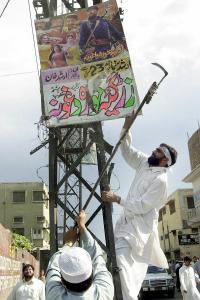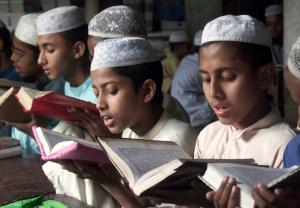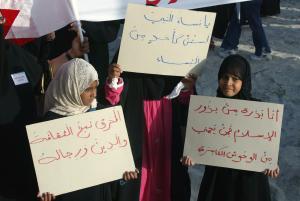|
Issue Date: March 26, 2004 Islam vs. McWorld Now that Buffy and Bart are raining down on traditionally Muslim societies from satellites, Islam finds itself in McWorld's cross hairs
Reviewed by JAMES L. FREDERICKS Since the crusade against terrorism replaced the Cold War as a way for Americans to clarify their moral role in this complicated world, there has been no shortage of advice on how we should be handling Muslims. For many, the Red Menace has been replaced by the Green Menace. Oriana Fallaci, in a book that she claims is “a scream rather than an essay,” warns us that Muslims “will vex and boss us always more and more. ’Til the point of subduing us. Therefore, dealing with them is impossible. Attempting a dialogue, unthinkable. Showing indulgence, suicidal. And he or she who thinks the contrary is a fool.” Good Italian Catholics like Fallaci, of course, were saying similar things about Jews when Il Duce was keeping the trains running on time. Anne Coulter has her own screaming to do. “We should invade their countries, kill their leaders and convert them to Christianity.” On the other side of the divide, John Kaltner would have us believe that “Jihad does not mean ‘Holy War.’ ” Perhaps as a contribution to world peace, the publisher could provide a desk copy of his book to Mr. bin Laden. In the interest of better understanding Muslims, Christians would be well advised to steer clear of demonizing Islam as well as sanitizing it. Muslims, like Christians, come in many different shapes and sizes. Instead of demonizing and sanitizing, Christians should find ways to build new forms of social and religious solidarity with Muslims today. This means entering into dialogue with Muslim believers -- dialogue in depth about issues that are sensitive to both Muslims and Christians. In building bridges of solidarity with Muslims, Christians will find themselves standing with a diverse community of believers struggling to respond to some sizable challenges, some of which Christians themselves have had to face in the past or will need to face in the future. These challenges include Zionism, in both its secular and religious forms, evangelical Christianity’s support for fanatical Jewish religious movements in Israel, and the dismal political and economic failures of post-colonial states in the Muslim world. Arguably the most daunting and least understood of the challenges facing Muslims, however, is the hegemony of American pop culture -- what Benjamin Barber has famously dubbed “McWorld.” In the Amazon basin, Indian kids wear Lakers T-shirts. In central China, women who are old enough to have memories of bound feet are marketed Max Factor cosmetics. And in the villages of Egypt and Saudi Arabia, Iran and Pakistan, imams call the men to Friday prayers looking down from their minarets on rooftops dotted with satellite dishes. Aggressive consumerism
McWorld is a comprehensive worldview, a way of life. The same, of course, must be said of Islam. And like Islam during some of its history, McWorld is in the midst of an aggressive expansion. McWorld erodes traditional ways of envisioning social relations and replaces them with its own image-driven, consumer-oriented mores. Since the guardian of social order has traditionally been religion, McWorld’s expansion has a secularizing effect. McWorld handles religions the way it handles toilet paper: Religious belief, like everything else, becomes a consumer choice. “Freedom of religion” is established by insuring a multiplicity of brands for religious consumers to choose from: Buddhism and Hinduism, Judaism and Christianity in their various forms. After some unpleasantness, Christianity has made its peace with McWorld. With a few exceptions --Martin Luther King and Desmond Tutu come to mind -- Christianity has learned to keep to its assigned place in the private realm of “personal piety,” safely out of the public square. Religions that contribute to the personal virtues McWorld requires of its denizens are “tolerant” and “moderate.” Religions that would challenge McWorld are “fanatical” and “extremist.” Now that Buffy and Bart are raining down on traditionally Muslim societies from satellites, Islam finds itself in McWorld’s cross hairs. The issue is not whether the imams can hold their own against Robert Schuller, but whether the Quran can compete with “Who Wants to Marry a Millionaire?” as a guideline for courtship in places like Iran and Pakistan. Christians need to understand that for many Muslims today, buzzwords like “democratic pluralism” and “open society” mean that Victoria’s Secret gets to show their daughters and sons what real womanhood is about. Muslims in very different parts of the world are now in the process of experimenting with new constructions of their faith in the hope of dealing with the hegemony of McWorld. Some of these constructions are, without doubt, scary. Others however, seek to engage the intrusive power of American pop culture in ways that are theologically sophisticated and spiritually insightful. For Christians whose relationship with McWorld has become altogether too chummy, these Muslims make particularly good dialogue partners. In order to dialogue in depth, we will need to learn a great deal about Islam. All four of the books being reviewed here offer themselves as introductions to Muslim tradition and orthopraxy. F.E. Peters and John Kaltner are academics. Ed Hotaling is a journalist with much experience in the Middle East. Vartan Gregorian must be placed in a category of his own: born in Iran, educated in the Levant, president of Brown University, now heading up the Carnegie Corporation. Peters and Kaltner limit themselves to introducing Islamic scripture, history and orthopraxis, and do not pretend to deal in any depth with contemporary challenges. Peters is by far the more reliable authority. Hotaling, the journalist, is more concerned with the problems that put Muslims on the front page of newspapers. Gregorian is a humanist who, from his perch at the head of the Carnegie Corporation, wants to contribute to interreligious understanding without ducking some important issues. These books, in what they do and in what they fail to do, raise several difficult issues for Christians and Muslims to look at together. The teachings of the Quran
Speaking in defense of the Anglo-American bombing of Kabul and Kandahar after 9/11, Tony Blair assured Britons that “Islam is a peaceful and tolerant religion,” and that the acts of terrorists such as Osama bin Laden are “contrary to the teachings of the Quran.” The prime minister may have read Kaltner’s book in reaching these surprising conclusions. Suicide bombers, Kaltner tells his readers, “cannot appeal to Islam to support their actions.” Of course, jihadi do in fact appeal to Islam to justify their activities, especially the Quran and the Hadith (the example and teachings of Muhammad). Saying they “cannot” is akin to the way some Christians claim that anti-Semites “cannot” appeal to the New Testament to justify their violence against Jews. The fact of the matter is that appealing to the New Testament is a time-honored practice of many Christian Jew-bashers. Kaltner also serves up a one-sided version of the history of Muslim-Christian relations. There is no proper treatment, for example, of Islam’s destruction of Christian North Africa, or its march across the Balkans to the gates of Vienna. Through much of its history, Islam’s infatuation with military expansion has posed a genuine threat to Christianity. Hotaling and Peters offer a more accurate view of Islam and its expansion. In its origins and much of its subsequent history, Islam can hardly be called tolerant and nonviolent. As head of both church and state in Medina, Muhammad adopted the tactics of caravan raiding against those who refused to submit to his political and religious authority. Abu Bakr, the first caliph, brought force to bear on the Bedouin tribes that had opted out of the ummah (the Islamic community) after the Prophet’s death. The caliphs in Damascus and Baghdad gave the non-Muslim peoples that came under their yoke the option of conversion or execution. Jews and Christians were given the special privilege of paying a head tax to their Muslim “protectors” for the privilege of living within the ummah with restrictions on their religious freedom. These policies are called for by the Quran itself. Kaltner spends a great deal of ink on Sura 2:256, which states, “There is no compulsion in religion.” Hotaling notes that, as a practical matter, Sura 9:5 (“Slay the idolaters wherever you find them”) and other passages from the “war suras” trumped 2:256 in much of the history of Quranic interpretation. Unwilling to sanitize the Quran and its violent history of effects, Hotaling comes to the sobering conclusion that Islam is not “a religion of peace like the other major religions.” Can he be including Christianity among these religions of peace? The Quran may be more bellicose than the New Testament, but certainly Islam is no more intolerant than Christianity has been in the past. As the tactics of Jesus’ generals from Theodosius to Oliver Cromwell make clear, Christianity has learned its tolerance not from the Sermon on the Mount but the hard way -- by submitting to the “guidance” of secular governments. Muslims would do well to follow the path taken by Christians in finding a limited political role within a pluralistic society. With this aim in mind, Christians and Muslims might gather for discussion around the works of a Catholic thinker like John Courtney Murray and Muslim modernists like Rashid Rida, Muhammad Iqbal or Mahmoud Mohamed Taha.
This dialogue should be pursued, however, with the recognition that reconciling Islam with McWorld poses a greater challenge to Muslims than it did for the majority of Christians. This is true for several reasons. For one, secular pluralism originated in the West, emerging gradually and violently from within Christian societies. The marginalization of religion, to which Christian believers had centuries to adjust, was imposed on Muslim people first by European colonialism and now by global mass media. Some contrasts are in order. Jews generally welcomed the rise of the secular spirit in Europe. Secularism loosened the grip of Christianity over Jewish lives by confining it to the private sphere. Religious Zionism represents a rejection of secularism by Jews. Christianity’s adjustment to secularism was gradual and uneven. For the most part, Catholics and Protestants stopped killing each other after the Treaty of Westphalia in 1648. Protestant groups generally accepted it after the revolutions of 1848. The Roman Catholic church officially accepted the principle of freedom of religion only in 1965. There is another reason that adjusting to McWorld poses a greater challenge to Muslims than it has for Christians: Because of its origins and subsequent development, Islam itself is poorly suited to reconciling itself with modern secular pluralism. When Roman Catholics began to be engaged by the modern world under the rubrics of aggiornamento and resourcement, they looked to the New Testament and found there a pre-Constantinian understanding of the church as a tiny community within an ambient culture that was both oppressing and alluring. When Muslims look to the Quran for renewal, they find there a vision of their community that is in its origins both a church and a state. Half of the Quran, the half Muhammad said should come first in the ordering of the suras, is a blueprint for a model society based on submission to the will of God as recited verbatim by the Prophet. A revived ummah, therefore, presents itself as a natural alternative to the corruption and social failures of secular postcolonial states. Establishing dialogue Roman Catholics, because their acceptance of liberal democratic pluralism is so recent, may have something to teach Muslims in this regard. They may have a great deal to learn from Muslims as well. Here, Kaltner makes a provocative observation. In regard to Islam’s allergy to secularism, he notes that “not all people think the same way and that what works in one part of the world is not necessarily applicable to people everywhere.” My response is conflicted. On the one hand, given the record of the Roman Catholic hierarchy in places like Spain and Argentina during the last century, separation of church and state would seem to be a blessing. The world needs to be protected from pious fascists such as Francisco Franco and their cheerleaders in the Catholic clergy. On the other hand, Christians need to take seriously the refusal of many Muslims to separate religion from politics. Is this not a major theme of the theology of liberation? Once religion is privatized and structural sin is off the table, Christianity can harmlessly preoccupy itself with sexual -- read “private” -- sins. Muslims may also have important things to say about how a privatized Christianity comes to serve the corporate interests of McWorld. Francis Fukuyama was not correct when he claimed that history had come to an end. The Cold War has not ended with a clear consensus that the society that best delivers on prosperity and justice is liberal, pluralistic, democratic and secular. The Quran, as Muslims know well, teaches that the ummah is the “best community ever brought forth among people” (3:110). Even if every society on earth ought to emulate the West and its secular ethos, not every society can emulate it and not every society will emulate it. In the post-Cold War period, a nonsecular, religious nation-state may prove itself a viable alternative to the secular model of nationhood embraced by the West. In this, Muslim societies need not turn to Iran for inspiration. The great example of a successful religious nationalism, with all its moral compromises and ambiguities vis-à-vis democratic pluralism, is Israel.
Is the war on terrorism in fact a war on Islam? In answering this question, evangelicals in the Bush administration, like Lt. Gen. William Boykin, are parsing their words carefully. Boykin believes that the election of Bush, despite his losing the popular vote, is miraculous. The general thinks his boss has been raised up by God to protect America from its enemies. Moreover, Boykin believes his God is “bigger” than the “idol” worshiped by his Muslim adversaries. Samuel Huntington’s much-discussed prediction of a “clash of civilizations” would suggest that the “clash of deities” promoted by the lieutenant general inevitably plays out as a Christian crusade against Islam -- despite what the president may have in mind. Gregorian has much to say about the clash of civilizations. Although he observes with irony the curious agreement between the old cold warriors in the Bush administration and the preachment of Islamic revivalists, Gregorian is skeptical about prognostications regarding an inevitable war with Islam. As his subtitle indicates, Islam is a “mosaic, not a monolith.” This is a basic truth about Muslims that the rhetorical bomb throwers like Coulter and Fallaci and the actual bomb throwers from within the ranks of Hamas and Al-Qaeda want to suppress. From Morocco to Mindanao Hotaling joins Gregorian in reminding his readers that “Islam” does not exist in the singular. Very different Muslim countries stretch from Morocco to Mindanao. My American Muslim students agree quite as much as their Christian classmates that religious belief should be a private choice. Arabs make up only a minority of Muslims in the world today -- and this has been the case for most of Islam’s history. As a result, we must learn to think of Islam as a religion with more than one center of gravity: Jeddah is not Jakarta. Dar es Salaam is not Detroit. The same, of course, must be said of Christianity. Gen. Efraín Rios-Mont, Guatemala's answer to Mullah Omar, is a Christian. Oscar Arias of Costa Rica, winner of the Nobel Peace prize, is as well. After his mal mot about the war on terrorism being a “crusade,” President Bush has tried to regain his rhetorical footing by making much of the image of Osama bin Laden hiding in a cave. The U.S. armed forces, we are assured, have “bunker-busters” specially modified to find their way deep into bin Laden’s subterranean hiding place to fill it with high-tech hell. For all their adroitness within the Dar-al-McWorld, how do President Bush’s words sound within the Dar-al-Islam? The president fails to realize that God found Muhammad and made him a prophet in a cave. The hegira, the flight from Mecca to Medina that gave birth to the ummah, began in a cave as well. Now, many Muslims, many moderate Muslims, look on the war against terrorism as a war on their religion. The enemies of Islam have come after the “Straight Path” in order to destroy it where it began -- in a cave. The challenge of communication-in-depth across the boundaries that separate civilizations is immense. Christians have an opportunity to contribute to the world’s well-being by building bonds of solidarity with Muslims today. I do not pretend that this will be an easy undertaking. Neither do I mean to suggest that Christians have an option in this regard. Dialogue with Muslims goes to the heart of Christianity’s mission of service to the world. Christians, therefore, must find ways of standing in solidarity with Muslims as they address the sizable challenges that confront them. Solidarity means that we recognize our Muslim neighbors as beloved of God and their religion as God’s creation. At least this is how John Paul II understands it. Gregorian offers his own insight into what Catholics mean by solidarity when he cites a 13th-century Persian poet, Saadi of Shiraz. “The children of Adam are limbs of one another … when the world gives pain to one, the other members find no rest.” Fr. James L. Fredericks teaches theology at Loyola Marymount University, Los Angeles. He is the author of the forthcoming book A New Solidarity: Doing Christian Theology in Dialogue with Buddhists, published by Orbis Books. National Catholic Reporter, March 26, 2004 |



